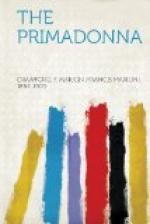Lady Maud could not have stayed away many minutes longer. She went back at once, entered by the garden window just as Margaret was finishing Rosina’s song, and remained standing behind her till she had sung the last note. English people rarely applaud conventional drawing-room music, but this had been something more, and the Craythew guests clapped their hands loudly, and even the elderly wife of the scientific peer emitted distinctly audible sounds of satisfaction. Lady Maud bent her handsome head and kissed the singer affectionately, whispering words of heartfelt thanks.
CHAPTER XIX
Through the mistaken efforts of Isidore Bamberger, justice had got herself into difficulties, and it was as well for her reputation, which is not good nowadays, that the public never heard what happened on that night at Craythew, how the three best men who had been available at headquarters were discomfited in their well-meant attempt to arrest an innocent man, and how they spent two miserable hours together locked up in a dark winding staircase. For it chanced, as it will chance to the end of time, that the doctor was out when the butler telephoned to him; it happened, too, that he was far from home, engaged in ushering a young gentleman of prosperous parentage into this world, an action of which the kindness might be questioned, considering that the poor little soul presumably came straight from paradise, with an indifferent chance of ever getting there again. So the doctor could not come.
The three men were let out in due time, however, and as no trace of a warrant could be discovered at that hour, Logotheti and Griggs being already sound asleep, and as Lord Creedmore, in his dressing-gown and slippers, gave them a written statement to the effect that Mr. Van Torp was no longer at Craythew, they had no choice but to return to town, rather the worse for wear. What they said to each other by the way may safely be left to the inexhaustible imagination of a gentle and sympathising reader.
Their suppressed rage, their deep mortification, and their profound disgust were swept away in their overwhelming amazement, however, when they found that Mr. Rufus Van Torp, whom they had sought in Derbyshire, was in Scotland Yard before them, closeted with their Chief and explaining what an odd mistake the justice of two nations had committed in suspecting him to have been at the Metropolitan Opera-House in New York at the time of the explosion, since he had spent that very evening in Washington, in the private study of the Secretary of the Treasury, who wanted his confidential opinion on a question connected with Trusts before he went abroad. Mr. Van Torp stuck his thumbs into his waistcoat pockets and blandly insisted that the cables should be kept red-hot—at international expense—till the member of the Cabinet in Washington should answer corroborating the statement. Four o’clock in the morning in London was only eleven o’clock of the previous evening, Mr. Van Torp explained, and it was extremely unlikely that the Secretary of the Treasury should be in bed so early. If he was, he was certainly not asleep; and with the facilities at the disposal of governments there was no reason why the answer should not come back in forty minutes.




